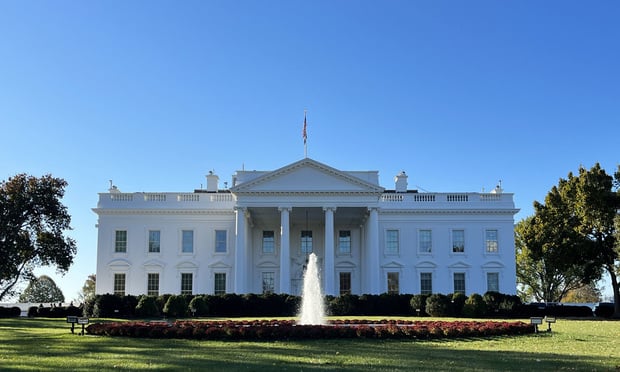 The White House in Washington. Photo: Diego M. Radzinschi/ALM
The White House in Washington. Photo: Diego M. Radzinschi/ALM
The anti-shutdown package President Joe Biden signed into law Saturday left out the provisions related to pharmacy benefit managers, and Sen. Ron Wyden says Elon Musk, an advisor to President Donald Trump who's on track to lead a new Department of Government Efficiency, pushed the PBM provisions out of the package.
The new American Relief Act, 2025 authorizes the government to stay open until March 14, and it still contains some Medicare and Medicaid provisions.
Recommended For You
House members voted 366-34 around 6 p.m. Friday evening to pass the ARA, 2025 package. Members of the Senate voted 85-11 around 12:50 a.m. Saturday morning to pass the package and send it to Biden's desk for his signature.
Originally, House Republican leaders backed a longer package that was posted Tuesday: the Further Continuing Appropriations and Disaster Relief Supplemental Appropriations Act, 2025.
The Further Continuing Appropriations package would have required PBMs to pass any discounts or rebates they negotiated on to employer-sponsored plans. The package also would have imposed extensive reporting requirements on employers' PBMs.
Related: New 'must pass' House package includes employer plan PBM section
Trump and Musk objected to some of the spending provisions in the first anti-shutdown package. They also wanted the package to include a provision eliminating the current limit on the national debt, to ease efforts to extend the tax cuts created by the Tax Cuts and Jobs Act of 2017.
Wyden said on the Senate floor that he believes that Musk is responsible for the elimination of the PBM provisions.
"Unfortunately, the very first act of the second Trump administration — or, should I say, the first Musk administration — was to step in and strip out the bipartisan agreement that stops the drug middlemen known as pharmacy benefit managers from ripping off taxpayers and seniors," Wyden said. "Donald Trump has spent the last week telling everybody who will listen that he wants to take on the drug middlemen... Well, at the very first opportunity to do that, he abandoned that pledge in order to follow Elon Musk’s lead."
The future: Many of the provisions cut out of the final ARA, 2025 package, including the employer PBM provisions, appear to continue to have broad, bipartisan support.
The PBM provisions could return in a stand-alone bill or as part of a new package in the 119th Congress, which starts Jan. 3.
Trump himself has talked for years about wanting to take on the pharmaceutical industry.
The ARA, 2025 provision letting the government shut down in March could lead to a new shutdown fight and a new chance for PBM rule change supporters to put PBM provisions in what drafters see as a "must pass" bill.
One obstacle for PBM bill supporters may be some lawmakers' hostility toward using big, must-pass emergency bills as ferry boats for getting other bills through Congress.
Rep. Tom Cole, R-Okla., said on the House floor that he thinks some of the sections cut out of the anti-shutdown package should reach the floor in the form of separate bills but did not belong in an anti-shutdown package.
"One of the reasons people distrust this institution is because we quite often pile things on bills that are totally unrelated," Cole said. "I hope we get back to doing what we should do, and that is, move legislation through this body appropriately, as narrowly focused as possible. And, these end-of-the-year or end-of-the-session or just-before-breaks massive bills... I don’t think they serve the American people well. I don’t think they serve this institution well."
© 2025 ALM Global, LLC, All Rights Reserved. Request academic re-use from www.copyright.com. All other uses, submit a request to [email protected]. For more information visit Asset & Logo Licensing.







